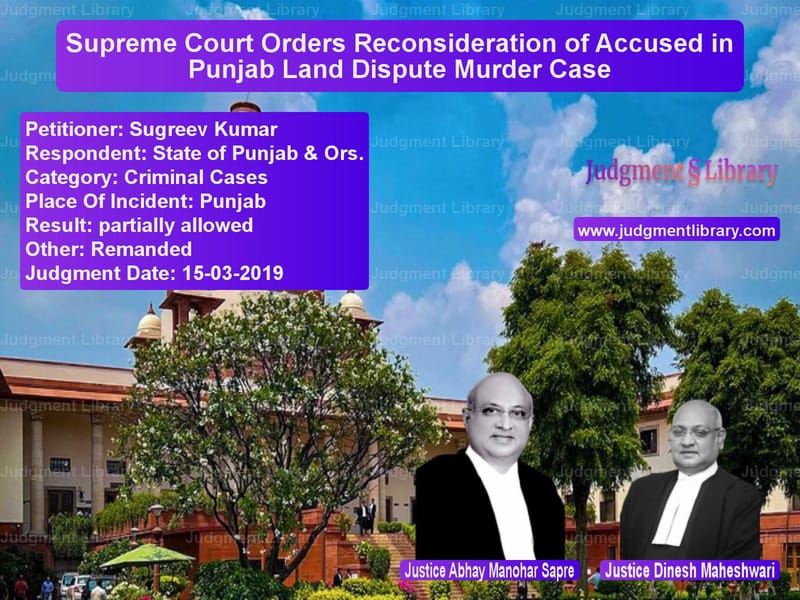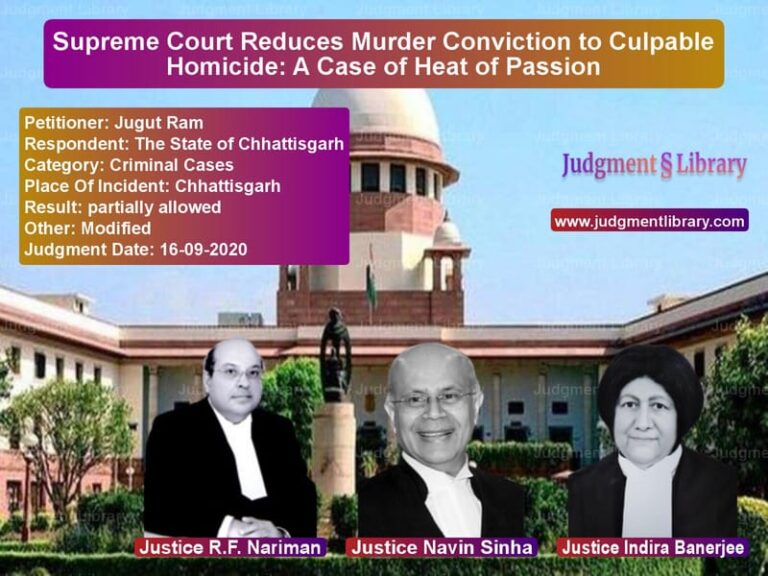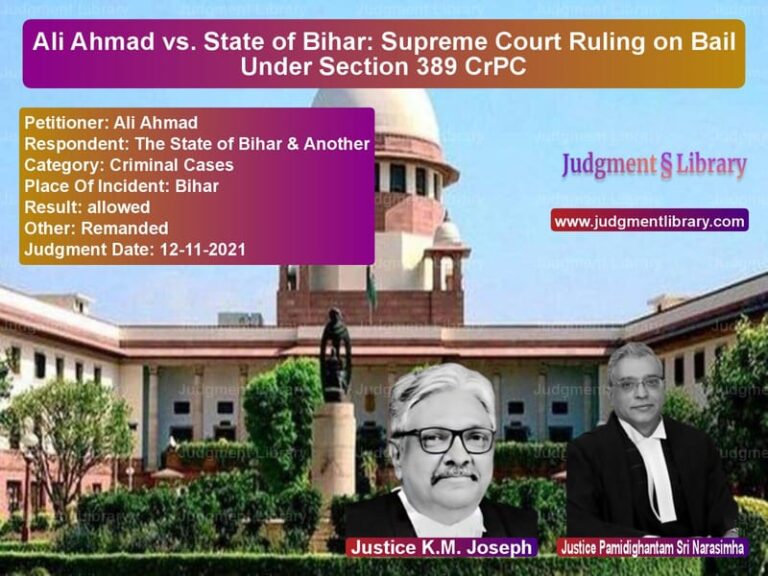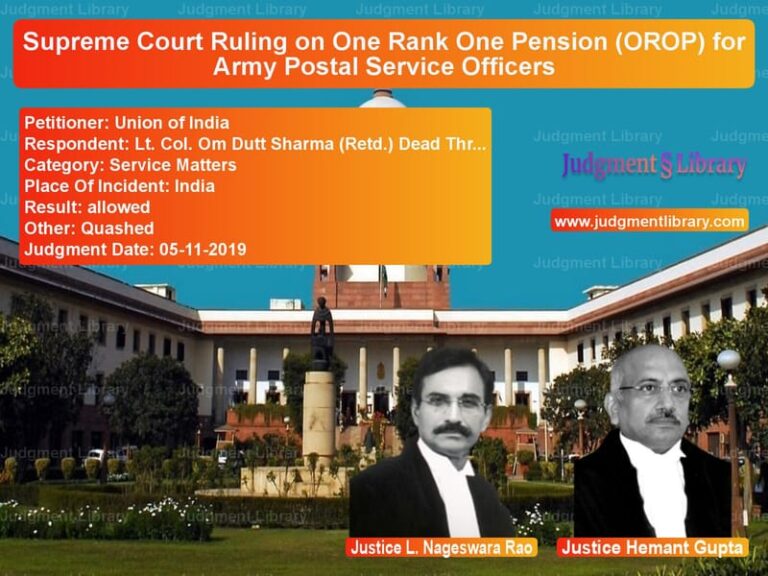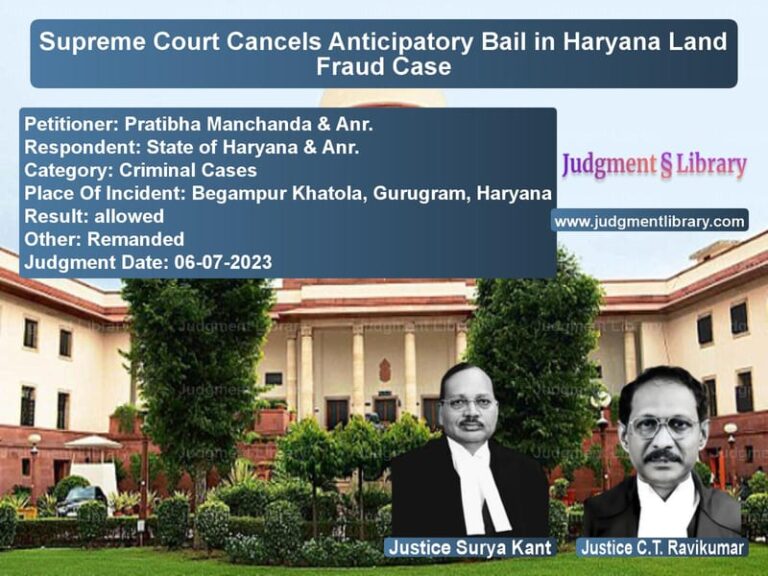Supreme Court Orders Reconsideration of Accused in Punjab Land Dispute Murder Case
The Supreme Court of India, in the case of Sugreev Kumar vs. State of Punjab & Ors., addressed the issue of summoning additional accused in a land dispute-related murder case under Section 319 of the Code of Criminal Procedure (CrPC). The ruling emphasized the importance of ensuring that all individuals responsible for a crime are brought to trial, even if they were not originally charge-sheeted by the police.
This case highlights the judicial system’s responsibility to uphold justice by allowing courts to summon additional accused based on emerging evidence during the trial.
Background of the Case
The case originates from a violent incident on August 29, 2013, in Punjab. The complainant, Sugreev Kumar, and his family had gone to reclaim their agricultural land, following a court order. While on their way back to the village, they were intercepted by 10-12 armed men, including the alleged former tenants of the land.
According to the prosecution:
- The accused were armed with pistols, rifles, swords, and other weapons.
- The complainant’s father and brother were killed in the attack.
- The complainant himself suffered three bullet wounds.
Following the attack, an FIR was filed against 11 individuals under Sections 302, 307, 341, 148, and 149 IPC, as well as Sections 27, 54, and 59 of the Arms Act. However, after investigation, the police charge-sheeted only three individuals: Vikram Gilla, Gurmit Singh, and Sunil Kumar.
Application Under Section 319 CrPC
During the trial, the complainant, who was also a key witness, testified that several others were involved in the attack, but the police had failed to charge them. He specifically named the following individuals:
- Krishan Dev
- Vikas (son of Krishan Dev)
- Rajan
- Mukesh @ Jungli
- Devinder @ Veeru
- Surinder Mahal
- Prithvi Raj
The prosecution filed an application under Section 319 CrPC, seeking to summon these seven individuals as additional accused based on the complainant’s testimony.
Trial Court’s Decision
The trial court partially allowed the application:
- It agreed to summon Sonu (son of Jaipal) because he allegedly fired three shots at the complainant.
- However, it rejected the request to summon the other seven accused, citing inconsistencies between the complainant’s testimony and his earlier statements.
The complainant then challenged the trial court’s ruling before the Punjab and Haryana High Court.
High Court’s Decision
The Punjab and Haryana High Court upheld the trial court’s ruling, stating:
“The evidence against Krishan Dev and Vikas was weak, as the complainant himself admitted that the possession of land had not yet been taken, contradicting his claim that they instigated the attack.”
Additionally, the High Court relied on the police investigation, which had found the seven individuals innocent.
Following this, the complainant moved the Supreme Court.
Arguments by the Petitioner (Sugreev Kumar)
The complainant argued that:
- Krishan Dev and Vikas planned the attack and instigated their associates.
- The police had wrongly declared the seven individuals innocent.
- Strong evidence, including the presence of an Innova car registered in the name of Krishan Dev, proved their involvement.
- The lower courts applied an incorrect standard of proof at the Section 319 CrPC stage.
Arguments by the Respondents (State of Punjab & Accused)
The accused, supported by the State, countered that:
- There was no new or compelling evidence against them.
- The police had conducted a thorough investigation and found no material to implicate them.
- The complainant’s testimony was inconsistent and unreliable.
Supreme Court’s Observations
The Supreme Court examined the legal framework under Section 319 CrPC and cited the case of Hardeep Singh v. State of Punjab (2014), which clarified that:
- Courts have the power to summon additional accused at any stage of the trial.
- The standard of evidence required under Section 319 is higher than a prima facie case but lower than proof beyond reasonable doubt.
- The court must be satisfied that the evidence is strong enough to warrant trial proceedings against the additional accused.
Applying these principles, the Supreme Court found that the High Court and trial court had set an excessively high standard of proof. It ruled:
“At the stage of Section 319 CrPC, the court is not required to establish guilt beyond reasonable doubt but only to determine whether there is enough material to try the additional accused.”
Final Judgment
The Supreme Court allowed the appeal in part, ruling that:
- The previous orders of the High Court and trial court were set aside.
- The prosecution’s application under Section 319 CrPC was restored for reconsideration by the trial court.
- The trial court was directed to re-examine the evidence and decide afresh whether the additional accused should face trial.
The Supreme Court also clarified:
“The trial court must assess the evidence against each individual accused separately and apply the correct legal standard under Section 319 CrPC.”
Conclusion
This ruling ensures that individuals who may have played a role in a crime are not left out of the judicial process due to investigative lapses. The judgment reinforces the judiciary’s duty to uphold justice by allowing courts to summon additional accused when sufficient evidence emerges during the trial.
By directing the trial court to reconsider the application, the Supreme Court ensures that no person involved in the crime escapes justice due to procedural technicalities.
Petitioner Name: Sugreev Kumar.Respondent Name: State of Punjab & Ors..Judgment By: Justice Abhay Manohar Sapre, Justice Dinesh Maheshwari.Place Of Incident: Punjab.Judgment Date: 15-03-2019.
Don’t miss out on the full details! Download the complete judgment in PDF format below and gain valuable insights instantly!
Download Judgment: Sugreev Kumar vs State of Punjab & Or Supreme Court of India Judgment Dated 15-03-2019.pdf
Direct Downlaod Judgment: Direct downlaod this Judgment
See all petitions in Murder Cases
See all petitions in Bail and Anticipatory Bail
See all petitions in Custodial Deaths and Police Misconduct
See all petitions in Judgment by Abhay Manohar Sapre
See all petitions in Judgment by Dinesh Maheshwari
See all petitions in partially allowed
See all petitions in Remanded
See all petitions in supreme court of India judgments March 2019
See all petitions in 2019 judgments
See all posts in Criminal Cases Category
See all allowed petitions in Criminal Cases Category
See all Dismissed petitions in Criminal Cases Category
See all partially allowed petitions in Criminal Cases Category

